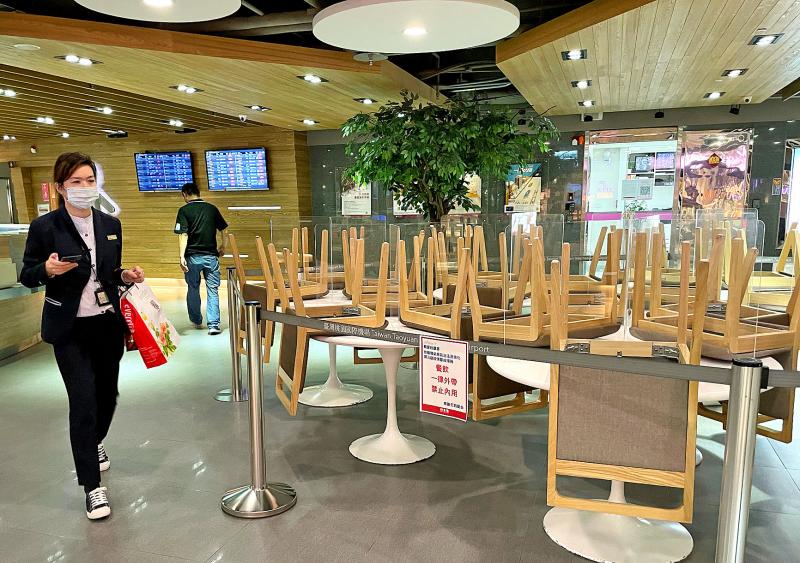The government’s tightened restrictions to control a domestic COVID-19 outbreak have reduced sales in the local food and beverage industry by more than 60 percent, an iChef Co Ltd (資廚管理顧問) survey said yesterday.
The restaurant mobile point-of-sale information advisory firm’s survey said that since the level 3 alert went into effect on May 15, average weekly sales generated by the food and beverage industry from May 17 to June 6 were less than 40 percent of the weekly average in April.
The survey covered more than 7,000 restaurants and food stalls nationwide to show the effect the restrictions have had on the sector, iChef said.

Photo: Liu Hsin-te, Taipei Times
A restaurant or food vendor that generates NT$600,000 a month, needs to achieve at least 70 percent of its usual sales to make a profit, iChef cofounder Ken Chen (程開佑) said.
Therefore many outlets have incurred losses, Chen said, adding that with no sign of domestic infections abating anytime soon, the industry should plan for the worst so that it can survive protracted restrictions.
Under the level 3 alert, restaurants and food stalls can provide only takeout services, while on-site dining is not allowed. The alert, which has been extended twice, is to continue until June 28.
The average revenue posted by the restaurant and food industry in the week to May 23, the week to May 30 and last week fell to 38 percent, 37 percent and 39 percent of the weekly average in April respectively, iChef said.
At the same time, sales reported by food delivery services rose 40 percent from before the imposition of level 3 restrictions, while revenue generated by online orders directly operated by restaurants and food vendors soared more than 400 percent, the survey found.
In the first three weeks of the level 3 alert, takeout and food delivery accounted for more than 70 percent of the industry’s total sales.
In the first, second and third week of the level 3 alert, sales from food delivery services rose 36 percent, 48 percent and 41 percent respectively, Chen said.
That indicates that the service seems to have hit a peak, potentially due to the limited capacity of restaurant and food delivery operators, and consumer plans to rein in consumption in preparation for longer restrictions, he said.

SEMICONDUCTORS: The German laser and plasma generator company will expand its local services as its specialized offerings support Taiwan’s semiconductor industries Trumpf SE + Co KG, a global leader in supplying laser technology and plasma generators used in chip production, is expanding its investments in Taiwan in an effort to deeply integrate into the global semiconductor supply chain in the pursuit of growth. The company, headquartered in Ditzingen, Germany, has invested significantly in a newly inaugurated regional technical center for plasma generators in Taoyuan, its latest expansion in Taiwan after being engaged in various industries for more than 25 years. The center, the first of its kind Trumpf built outside Germany, aims to serve customers from Taiwan, Japan, Southeast Asia and South Korea,

Gasoline and diesel prices at domestic fuel stations are to fall NT$0.2 per liter this week, down for a second consecutive week, CPC Corp, Taiwan (台灣中油) and Formosa Petrochemical Corp (台塑石化) announced yesterday. Effective today, gasoline prices at CPC and Formosa stations are to drop to NT$26.4, NT$27.9 and NT$29.9 per liter for 92, 95 and 98-octane unleaded gasoline respectively, the companies said in separate statements. The price of premium diesel is to fall to NT$24.8 per liter at CPC stations and NT$24.6 at Formosa pumps, they said. The price adjustments came even as international crude oil prices rose last week, as traders

SIZE MATTERS: TSMC started phasing out 8-inch wafer production last year, while Samsung is more aggressively retiring 8-inch capacity, TrendForce said Chipmakers are expected to raise prices of 8-inch wafers by up to 20 percent this year on concern over supply constraints as major contract chipmakers Taiwan Semiconductor Manufacturing Co (TSMC, 台積電) and Samsung Electronics Co gradually retire less advanced wafer capacity, TrendForce Corp (集邦科技) said yesterday. It is the first significant across-the-board price hike since a global semiconductor correction in 2023, the Taipei-based market researcher said in a report. Global 8-inch wafer capacity slid 0.3 percent year-on-year last year, although 8-inch wafer prices still hovered at relatively stable levels throughout the year, TrendForce said. The downward trend is expected to continue this year,

Taiwan Semiconductor Manufacturing Co (TSMC, 台積電), which supplies advanced chips to Nvidia Corp and Apple Inc, yesterday reported NT$1.046 trillion (US$33.1 billion) in revenue for last quarter, driven by constantly strong demand for artificial intelligence (AI) chips, falling in the upper end of its forecast. Based on TSMC’s financial guidance, revenue would expand about 22 percent sequentially to the range from US$32.2 billion to US$33.4 billion during the final quarter of 2024, it told investors in October last year. Last year in total, revenue jumped 31.61 percent to NT$3.81 trillion, compared with NT$2.89 trillion generated in the year before, according to